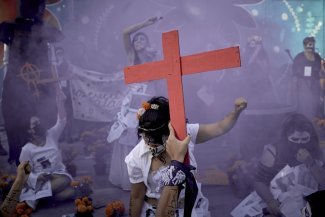
We know that climate change will make natural disasters increasingly frequent and increasingly devastating. Still, we cannot avoid feeling shock, sadness and fear every time we hear about the latest catastrophe.
For many reading this article, the exotic names of Vanuatu and Tuvalu might not mean much. But for those following climate discussions, we know we are talking about the small island developing states (SIDS) whose very existence are at risk due to rising sea levels.
This weekend, the violence of Cyclone Pam – in which at least 24 people have been killed and 3,300 people displaced – illustrated a harsh reality.
For the world’s most vulnerable countries, climate change isn’t just about a slow increase in sea levels; it’s about dramatic disruption, sudden losses and sometimes, total devastation.
To quote the president of Vanuatu, Baldwin Lonsdale: “We see the level of sea rise…the cyclone seasons, the warm, the rain, all this is affected….yes, climate change is contributing to this.”
In a variation from the same sad coincidence that put Typhoon Haiyan in focus while the United Nations were talking about climate change in Poland, Cyclone Pam hit the Pacific islands just as the world’s biggest conference on disaster risk reduction was taking place in Sendai, Japan.
What will be the response from the international community for Tuvalu and Vanuatu. If we are to judge by the current drafts, we can expect very little. A people who didn’t have much to begin with and have now lost everything can basically expect a pat on the back and a message to “Stay strong guys! And make sure you get good insurance coverage…”.
The idea that people will have to accept disaster management as a way of life, that they will never see their country develop a strong social protection system with human rights at its beating heart – but rather private coverage for the wealthy – is as distressing as the disasters themselves.
In an opening speech at the Sendai conference, trade unions brought yet another issue to the table: that preventing losses is not just a matter of sustainable infrastructure or money – even if those in most critical need are in the poorest countries.
It is also about investing in people, particularly those that –while iconic in any disaster relief operation – are totally ignored by the United Nations.
We’re talking about those workers on the front lines.
Firefighters, ambulance drivers and other emergency service workers; health workers in hospitals, health clinics and schools; those outside in the dark mobilised to fix power and water supplies; public transport workers; police and other uniformed service workers; and the many more who are called upon in times of danger, to leave their families and risk their lives to protect our own.
Improving their skills and securing their rights must also be part of the deal.
Once again, the UN system is failing to connect the dots. As a result, natural disasters will keep being used to promote a neoliberal agenda. Our union representatives and other civil society friends in Sendai will stand strong, so that we put people, their rights and their needs first – not money.








